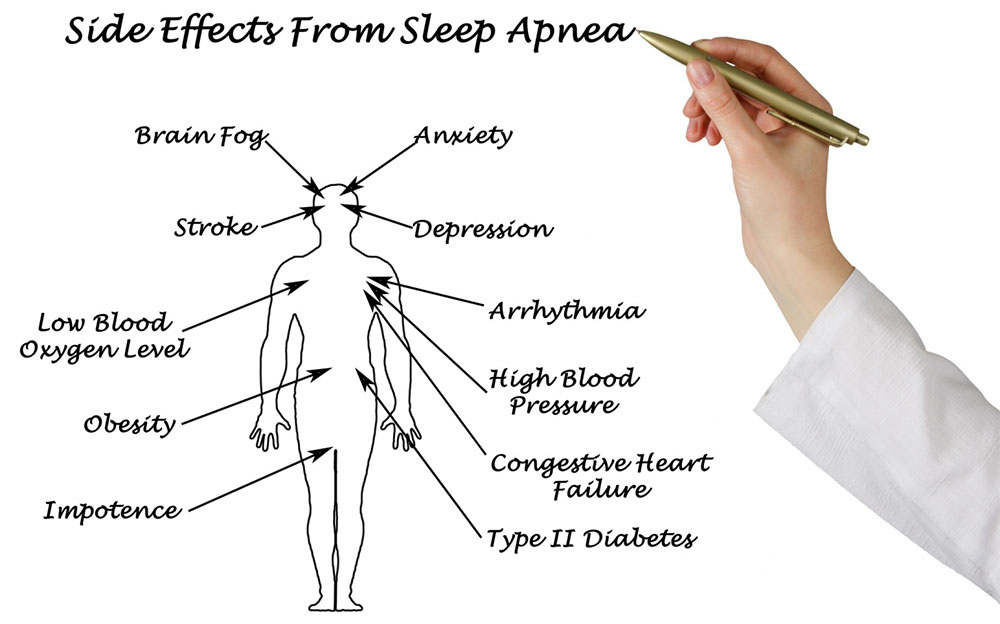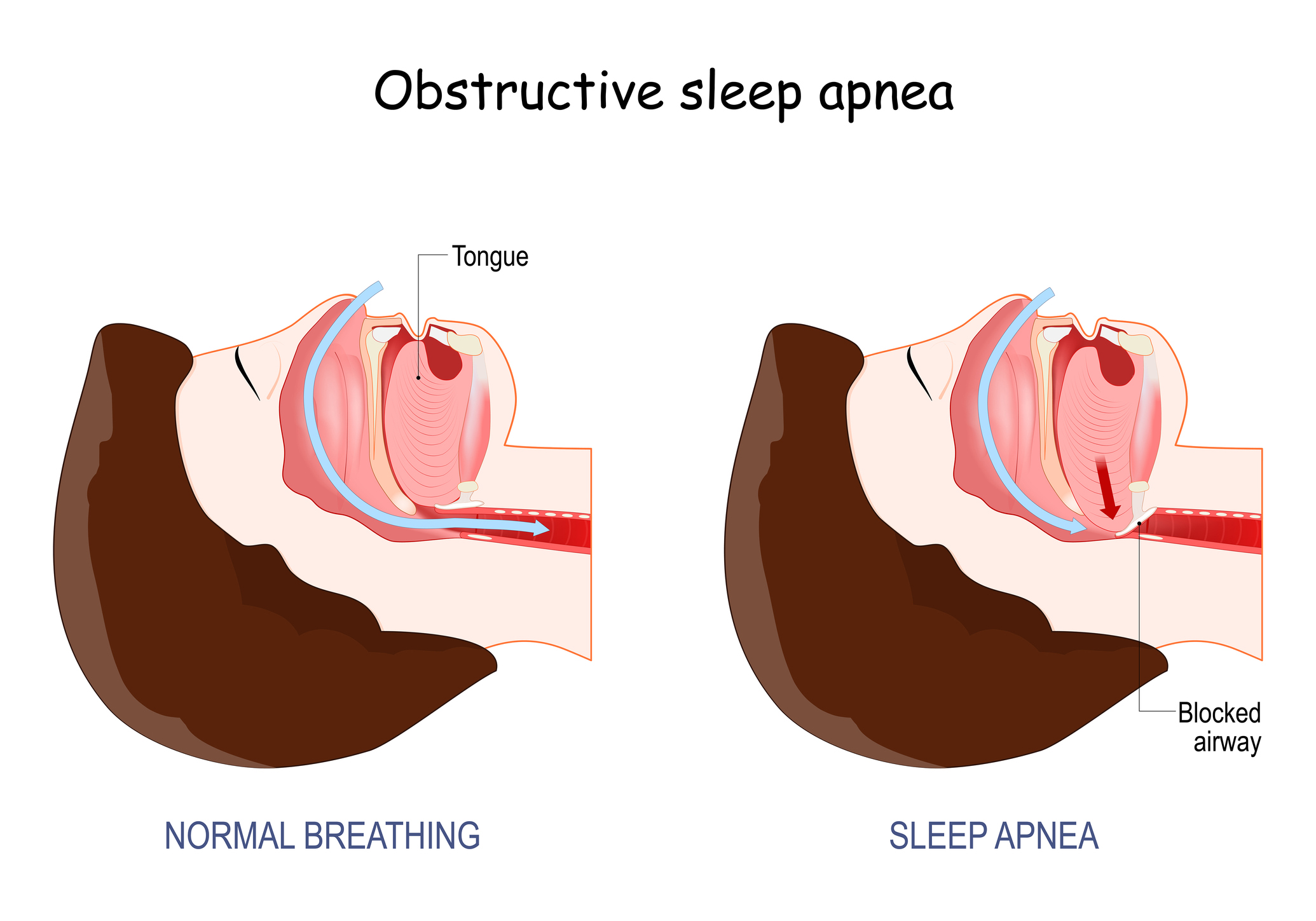
Where to go for treatment?
Comprehensive Sleep Care Center has the area’s top sleep medicine specialists with 10 convenient locations in Virginia and Maryland (Alexandria, Arlington, Bethesda, Chantilly, Dumfries, Fredericksburg, Germantown, Lansdowne, Manassas and Woodbridge). We diagnosis and treat over 80 types of sleep disorders including Obstructive Sleep Apnea.
The World Health Organization estimates 100 million individuals across the globe suffer from sleep apnea. In fact, an American Sleep Apnea Association report states that sleep apnea affects 1 in 4 men, particularly African-American and Hispanic men, and 1 in 9 women across the United States. Therefore, it is estimated that between 50 million and 80 million Americans have sleep apnea. In addition, it is speculated that close to 80 percent of all sleep apnea patients remain undiagnosed, causing people to potentially battle a host of life-threatening health risks such as high blood pressure, stroke, heart attack, and heart failure.
The main types of sleep apnea are:
- Obstructive Sleep Apnea, the more common form that occurs when throat muscles relax
- Central Sleep Apnea, which occurs when your brain doesn’t send proper signals to the muscles that control breathing
- Complex Sleep Apnea Syndrome, also known as treatment-emergent central sleep apnea, which occurs when someone has both obstructive sleep apnea and central sleep apnea
What Happens During an Apnea?
If you have OSA your soft palate sags and the tongue relaxes as it slides backward which can partially or totally obstruct your airway. Obstructive Sleep Apnea can occur in varying degrees of severity from mild to moderate to severe. Whether your airway is narrowed, partially collapsed, or obstructed, snoring may (but not always) occur. If your airway is blocked, the oxygen levels in the body fall. As a resulting defense mechanism in the brain, your body is triggered to resume normal breathing once again by gasping or awakening. This constant arousal (many people do not fully awake) does not allow the body to get into the deep restful / recovery sleep the body needs.
Sleep Apnea Symptoms and Signs
- Waking up with a sore/dry throat
- Loud snoring
- Waking up with a choking or gasping sensation
- Sleepiness or lack of energy during the day
- Sleepiness while driving/drowsy driving
- Restless sleep
- Morning headaches
- Decreased interest in sex
- Recurrent awakenings or insomnia
- You have Type 2 diabetes or other health problems and weight gain
Factors That Increase the Risk of Sleep Apnea
- A small upper airway (or large tongue, tonsils or uvula)
- Being overweight
- Having a recessed chin, small jaw, or a large overbite
- A large neck size (17 inches or greater in a man, or 16 inches or greater in a woman)
- Smoking
- Alcohol use
- Age 40 or older
- Ethnicity (African-Americans, Pacific Islanders, and Hispanics)
- Also, OSA seems to run in some families, suggesting a possible genetic basis
Important Facts About Sleep Apnea
- Obstructive sleep apnea increases the risk of heart failure by 140%, the risk of stroke by 60%, and the risk of coronary heart disease by 76%
- Obstructive sleep apnea is thought to be more prevalent than both asthma and adult diabetes, possibly affecting more than 50 million Americans
- Public health advocates think it may be as big a public health hazard as smoking
- The National Commission on Sleep Disorders Research estimated that sleep apnea is probably responsible for 38,000 cardiovascular deaths yearly
What Happens to Your Body When You Don’t Get Enough Sleep?
According to the U.S. Centers for Disease Control and Prevention 30 percent, (roughly 40.6 million) American adults are sleeping six (6) or fewer hours a day, and night shift workers, particularly those in transportation, warehouse and health care industries are at the most risk of not getting enough sleep. Less sleep, coupled with potential sleep disorders can create health problems, such as:
- High blood pressure
- Heart disease – including sudden cardiac death
- Stroke
- Type-2 Diabetes
- Weight gain
- Greater risk of car accidents due to drowsiness
- Depression/anxiety
- Decreased sex drive
How is Sleep Apnea Diagnosed?
One of the fundamental problems facing individuals who might suffer from sleep apnea is their lack of awareness of the condition and its symptoms. Hence, it is vitally important that any person experiencing sleep apnea symptoms receives an accurate sleep disorder diagnosis from their healthcare provider. If you feel you or your partner may have sleep apnea, call Comprehensive Sleep Care to schedule a consultation with one of our sleep medicine physicians.
One of the most common methods used to diagnose sleep apnea is a sleep study, which may require an overnight stay at one of our sleep centers or possibly an at home test kit.
Is it Dangerous to Leave Sleep Apnea Untreated?
If your sleep apnea is left untreated, you will continue to experience disrupted sleep and fatigue that can have very negative impacts on your overall health. With lack of restful sleep, it is likely you may have difficulty with concentration, reasoning, and reaction timing. What you may not realize is that you are at a higher risk to develop other health problems, such as high blood pressure, heart attack, stroke, type 2 diabetes, and even experience accidents at work or behind the wheel of your car.
Get It Checked Out
If you suspect you may have sleep apnea, the first thing to do is schedule a consultation with your doctor or one of our sleep medicine physicians here at Comprehensive Sleep Care Center. The good news is that sleep apnea is an easily treatable condition – we have many treatment options available, such as CPAP Therapy, Oral Appliance Therapy and Inspire Therapy. These and other therapies can help you rest easier, feel better during the day, and reduce your risk of potentially dangerous health complications.


